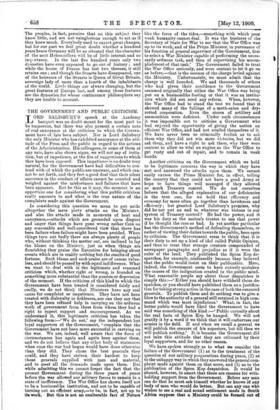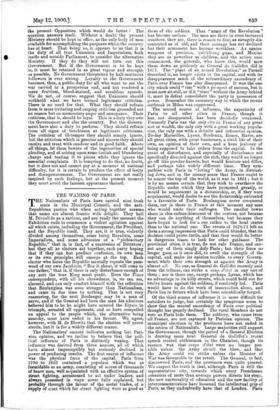THE GOVERNMENT AND PUBLIC CRITICISM.
TORD SALISBURY'S speech at the Academy I banquet was no doubt meant for the most part to be humorous, but there was also present a certain note of real annoyance at the criticism to which the Govern- ment have of late been subject. Nor is Lord Salisbury the only Minister who has exhibited annoyance at the atti- tude of the Press and the public in regard to the actions of the Administration. His colleagues, or some of them at any rate, have also shown signs, we will not say of irrita- tion, but of impatience, at the fire of suggestions to which they have been exposed. This impatience is no doubt very natural, for the Government have had difficulties to con- tend with of which the public are unaware, and which can- not be set forth, and they fret a good deal that their silent successes in the conduct of affairs cannot be counted and weighed against the misfortunes and failures that have been apparent. But be this as it may, the moment is an opportune one for considering what this public criticism really amounts to and what is the true nature of the complaints made against the Government.
In considering this question we mean to put aside altogether the mere party attacks on the Ministry, and also the attacks made in moments of beat and annoyance,—attacks which are grounded upon disgust and anger that things have gone wrong rather than on any reasonable and well-considered view that there has been failure when failure might have been avoided. When things turn out badly there are always plenty of people who, without thinking the matter out, are inclined to lay the blame on the Ministry, just as when things are flourishing they praise the Executive for bringing about events which are in reality nothing but the results of good fortune. Such blame and such praise are of course value- less, and should be passed by with equal indifference. What we want to deal with is the legitimate and reasoned criticism which, whether right or wrong, is founded on something more substantial than the passion or depression of the moment. If the criticism of this kind to which the Government have been treated is considered fairly and coolly, we do not think that Ministers have any real cause for complaint or impatience. They have not been treated with disloyalty or fickleness, nor can they say that they have been refused help in carrying on the arduous work of government from those from whom they had a right to expect support and encouragement. As we understand it, this legitimate criticism has taken the following form We do not,' say the independent but loyal supporters of the Government, complain that the Government have not been more successful in carrying on the war. We are, indeed, well aware that the force of circumstances has again and again been against them, and we do not believe that any other body of statesmen when once the war had begun would have done otherwise than they did. They chose the best generals they could, and they have striven their hardest to keep those generals supplied with men and material, and to meet all the demands made upon them. But while admitting this we cannot forget the fact that the present Government during the three years of peace before the war allowed our military forces to remain in a state of inefficiency. The War Office has shown itself not to be a businesslike institution, and not to be capable of turning out an efficient army,—to be, in fact, not up to its work. But this is not an unalterable fact of Nature like the force of the tides,—something with which poor weak humanity cannot deal. It was the business of the Secretary of State for War to see that the War Office was up to its work, and of the Prime Minister, in pursuance of his function of general supervisor of the Government, first to select a War Minister capable of performing the neces- sarily arduous task, and then of supervising his accom- plishment of that task.' The Government failed to treat the War Office seriously, and were content to let it go on as before,—that is the essence of the charge levied against the Ministry. Unfortunately, we must admit that the charge is well founded. We and thousands of others who had given their confidence to the Government assumed originally that either the War Office was being put on a businesslike footing or that it was an institu- tion which did not need any reform. When, however, the War Office had to stand the test we found that it showed many of the failings of a moth-eaten and dry- rotted corporation. Even the stores of artillery and ammunition were deficient. Under such circumstances it was impossible not to criticise a Government who had enjoyed the opportunity of giving the nation an efficient War Office, and had not availed themselves of it. We have never been so criminally foolish as to ask them why they did not win more victories, but we did ask them, and have a right to ask them, why they were content to allow so vital an engine as the War Office to get rusty and out of repair, and to remain in weak hands.
Another criticism on the Government which we hold to be legitimate concerns the way in which they have met and answered the attacks upon them. We cannot easily excuse the Prime Minister for, in effect, telling the country that they could not have a good Army or hope to have things well managed if they allowed so much Treasury control. We do not ourselves believe that the alleged explanation of our deficiencies is the true one, for we hold that efficiency and economy far more often go together than lavishness and efficiency; but granted Lord Salisbury's premises, why did he not pat an end to whatever was vicious in our system of Treasury control ? He had the power, and it was his duty as the nation's trustee to use that power if he thought the case so bad. In yet another particular has the Government's method of defending themselves, or rather of viewing their duties towards the public, been open to criticism. The Government seem to think that it is their duty to set up a kind of idol called Public Opinion, and then to treat that strange creature compounded of newspaper paragraphs and prejudice as if it were the ruler of the land. They published the Spion Kop de- spatches, for example, confessedly because they believed that the public would insist on their publication. here, indeed, the Government seem to have entirely mistaken the causes of the indignation created in the public mind. What reasonable people say about those despatches is simply this Either you should have withheld those de- spatches, or you should have published them as a justifica- tion for taking strong action in the case of both the censured generals.. To publish them and do nothing was to give a blow to the authority of a general still retained in high com- mand which was most injudicious.' What, in fact, the better public would have liked the Government to have said was something of this kind Public curiosity about the real facts of Spion Kop be hanged. We will not gratify it by a word if we think that it will embarrass our armies in the field. If and when we recall a general we will publish the censure of his superiors, but till then we will publish nothing.' It is because the Government did not take this attitude that they are criticised by their loyal supporters, and for no other reason.
We have spoken strongly as to what we consider the failure of the Government (1) as to the treatment of the question of our military preparations during peace, (2) as to the unhappy way in which they answered the general com- plaint made against them on that score, and (3) as to the publication of the Spion Sop despatches. It would be absurd, however, to assert that these are reasons for with- holding support from the Government. Before any man can do that he must ask himself whether he knows of any body of men who would do better. But can any one who wishes to see a real and sound settlement made in South Africa suppose that a Ministry could be formed out of the present Opposition which would do better ? The question answers itself. Without a doubt the present Ministry should be kept in office, as the only body of men available for accomplishing the purposes which the country has at heart. That being so, it appears to us that it is the duty of all true Unionists and Imperialists, both inside and outside Parliament, to consider the alternative Ministry. If they do they will not turn out this Government. But if the Government is to be kept in, it must be retained in as great vigour and strength as possible. No Government threatened by half-mutinous followers is ever strong. Loyalty to the Government becomes, then, a public duty for all who want to see the war carried to a prosperous end, and not rendered a mere fruitless, blood-stained, and resultless episode. We do not, of course, suggest that Unionists should withhold what we have termed legitimate criticism. There is no need for that. What they should refrain from is mere irritating and carping criticism grounded not on reason but on momentary anger and annoyance. Their criticism, that is, should be loyal. This is a duty they owe the Government and also the country. But the Govern- ment have also a duty to perform. They should refrain from all signs of touchiness at legitimate criticisms. The criticism of ill-temper they should simply ignore, but the criticism which is genuine and sincere they should receive and treat with candour and in good faith. Above all things, let them beware of the ingenuities of special pleading, and of seizing upon some foolish and blundering charge and tearing it to pieces while they ignore the essential complaints. It is tempting to do that, no doubt, but it does not and cannot pay at a moment of national difficulty, for it is certain to produce the effect of levity and disingenuousness. The Government are not really inspired by such feelings, but at the present moment they must avoid the faintest appearance thereof.







































 Previous page
Previous page